To successfully gain muscle mass, nutrition and training are inseparable. Workouts without proper nutrition will yield little results, and vice versa.
The first thing to remember is that a slight caloric surplus to gain muscle is necessary.
Several clinical studies have expanded our knowledge in this field, including this study conducted in 2019. To gain 1 kg of muscle mass, 350 to 480 extra calories per day are recommended.
The increase in weight on the scale should be gradual to limit fat gain in favor of muscle. A benchmark: 0.500 kg to 1 kg per week is a good average.
To help you plan balanced meals for gaining muscle mass, I offer you a typical day. Let’s imagine your daily needs are 2,700 kcal per day, 400 additional calories for gaining muscle, which makes a day of 3,100 calories.
📚 Also read | Muscle Gain Objective: a dietician has selected the 4 best whey isolates
1. A Protein-rich Breakfast
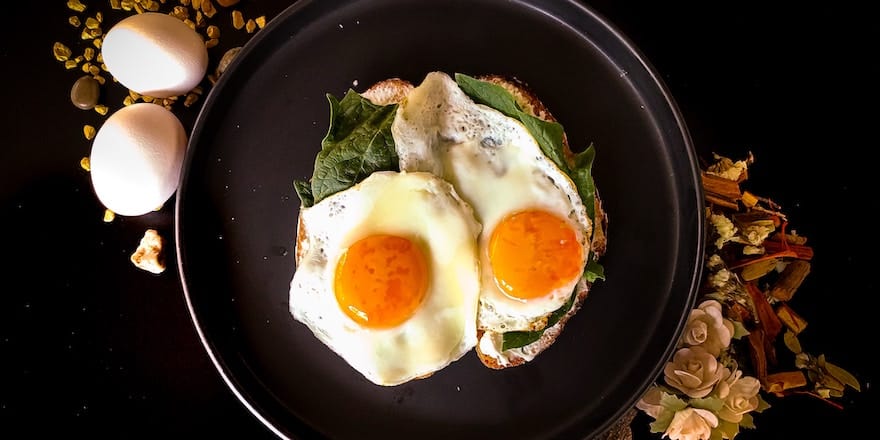
A muscle gain breakfast should be rich enough in protein. Upon waking, it is essential to break the overnight fast with foods rich in vitamins, fibers, and healthy fats to satiate the body.
- 2 fried eggs
- 100 g of whole grain bread + peanut butter
- 1 apple
Other ideas to vary from whole grain bread:
- Oat flakes
- Unsweetened muesli
2. A High-protein Shake
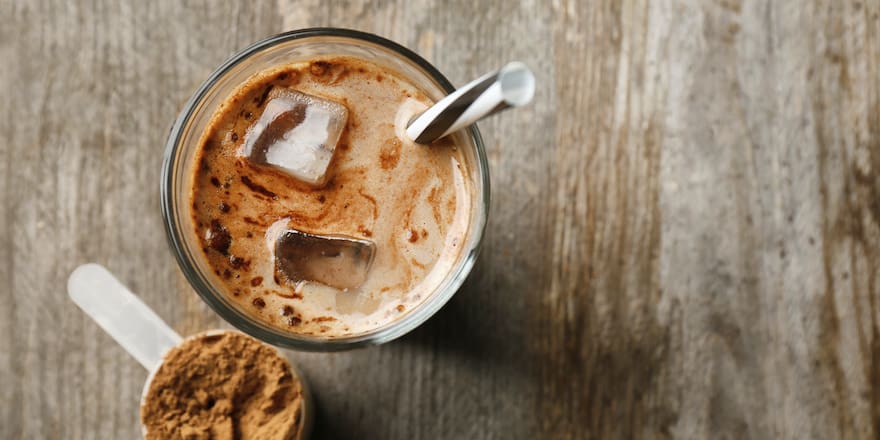
During muscle gain, supplementing your diet with dietary supplements can be useful. Conveniently, their nutritional composition is also perfectly suited.
Prefer a gainer based on whey, with carbohydrates and low in fat.
3. A Balanced Lunch
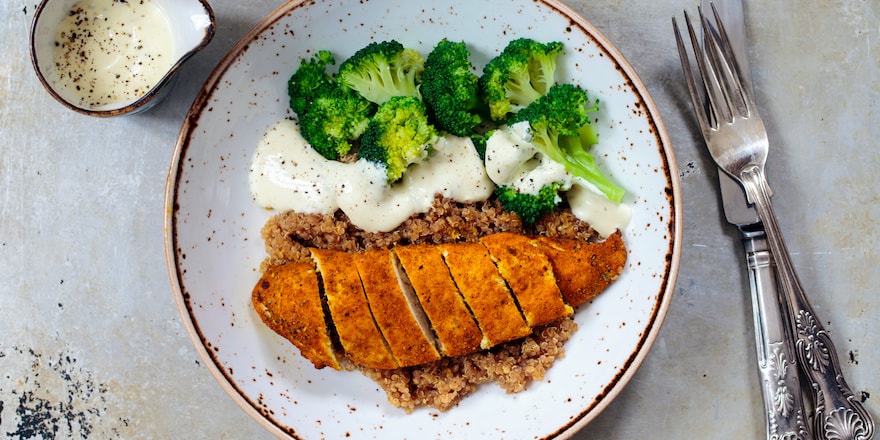
Prefer lean proteins for a muscle gain meal: white meats (turkey, rabbit, veal, skinless white ham, pork tenderloin…), white fish, fatty fish (sardines, mackerel, trout…) and red meats up to twice a week.
Favor sources of omega-3s for your lipids by varying vegetable oils and with healthy foods like avocados or nuts.
- 100 g of grated carrots, seasoned with canola oil
- ½ avocado
- 150 g of chicken breast
- 200 g of quinoa
- 200 g of broccoli with 1 tablespoon of olive oil
4. An Afternoon Snack
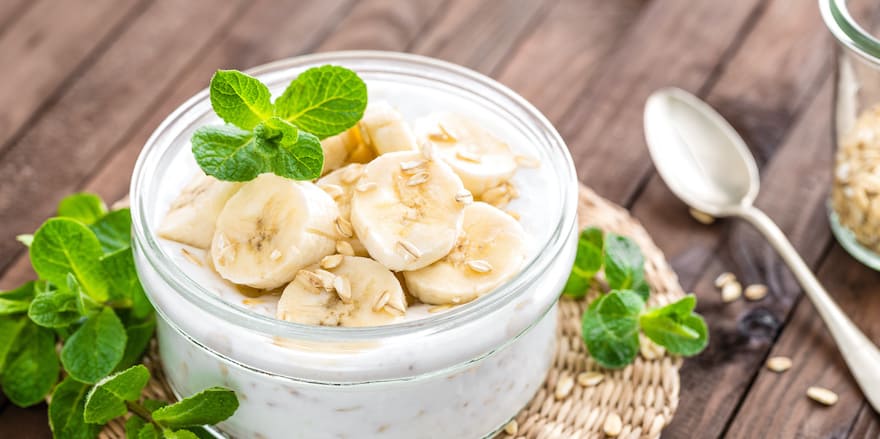
The afternoon snack is essential when lunch and dinner are far apart: to complete daily calories and especially to provide energy!
If you train around 6 pm, this muscle gain snack will boost your workout by sparing your energy reserves.
- 200 g of 0% fat yogurt
- 1 protein-rich cereal bar
- 1 banana
5. A Personalized Dinner
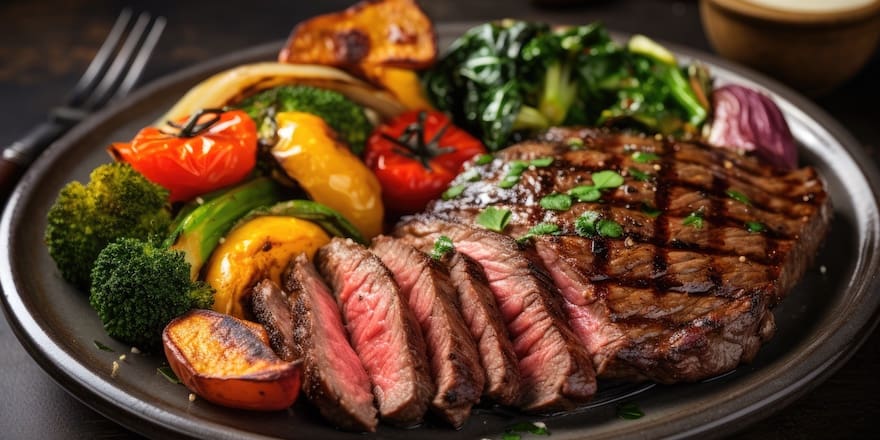
- 150 g of 5% lean ground beef
- 150 g of cooked basmati white rice
- 200 g of grilled vegetables (eggplant, zucchini, and peppers)
- 2 tablespoons of olive oil
There are many alternatives to vary starches:
- sweet potato
- white or semi-whole grain pasta depending on your digestive tolerance
- buckwheat
- legumes, essential if you’re vegetarian: red beans, chickpeas, coral or green lentils…
My Tips for Successful Muscle Gain
Three Essential Nutrients for Muscle Gain
Muscle is mainly composed of protein and water. Sufficient hydration and a strategic distribution of nutrients are the basis of optimal muscle growth.
Three nutrients are essential:
- fats
- proteins
- carbohydrates
When engaging in weight training, strength sports, or team sports, the ideal distribution of nutrients for muscle mass gain is as follows: 55 to 60% carbohydrates, 20 to 25% proteins, 20 to 25% fats.
All are essential to nourish the muscle, promote its development, and meet the needs of your body.
Do not drastically reduce sugar or fat
Several studies have focused on following a ketogenic diet in athletes. Most have shown that it leads to maintenance or loss of muscle mass, but few results in terms of growth.
The same goes for fats during mass gain. To avoid hormonal disruptions, do not try to reduce them drastically. Good fat is needed!
🎧 Listen to the podcast | Fat, it’s life ?
Sports nutrition is always personalized
Sports nutrition must always be personalized: beginner, intermediate, or professional, the approach is not quite the same. Other factors (age, gender, genetics…) also count.
Adapt the quantities of course. Whether you are a woman or a man, short or tall, beginner or advanced, boxer or basketball player… everyone needs their own mass gain approach.
Depending on your initial form weight and your body’s response to this new diet, the duration of the mass gain diet may vary.
Do not hesitate to consult a dietitian specialized in sports nutrition to support your diet.
Where to start?
The number of meals for mass gain can vary between 3 to 6 per day. You can opt for two protein shakes a day if adding meat, fish, and eggs to each meal is difficult for you, or if you are vegan.
Or, for example, prefer a post-workout shake if you do not dine quickly after the session.
Several methods exist to calculate your caloric needs for mass gain. If you have a stable weight, I suggest keeping it simple by initially adding snacks and observing how your body reacts.
Keep in mind that the goal during this period is to limit muscle catabolism in favor of muscle anabolism.
Weigh yourself weekly to know if the mass gain meals suit you, whether they are too rich or not rich enough.
Sources and scientific studies
Vargas et al. 2018. Efficacy of ketogenic diet on body composition during resistance training in trained men: a randomized controlled trial.
Slater et al. 2019. Is an Energy Surplus Required to Maximize Skeletal Muscle Hypertrophy Associated With Resistance Training.
K J Cureton, M A Collins, D W Hill, F M McElhannon Jr, 1998. Muscle hypertrophy in men and women.
Klaas R Westerterp, 2012. Dietary protein and weight gain.
Bray et al. 2012. Effect of dietary protein content on weight gain, energy expenditure, and body composition during overeating: a randomized controlled trial



